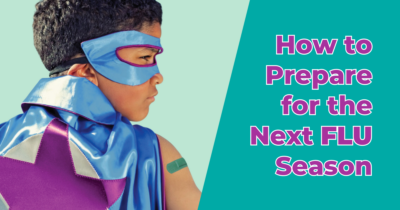How to Prepare for the Next Flu Season

While flu isn’t usually top of mind during the busy summer months, it’s always important to plan ahead to prepare for the next flu season. In the midst of vacations, summer camps, sports, and picnics, remembering to stay vigilant on flu preparedness is key to staying protected and healthy so when flu season hits in the fall and into winter, you are one step ahead.
Stock up on Flu-Fighting Essentials
Don’t forget to pick up essentials to fight the flu when you are out shopping! This includes having masks on hand should you need one, disinfectant wipes and hand sanitizer for on-the-go, disinfectant spray, paper towels (or reusable cloths) for wiping down frequently touched surfaces, latex gloves, and antibacterial soap. Having these essentials on hand will make it easier to kill germs.
Plan your Annual Flu Vaccine
According to the CDC, influenza vaccination is the single best way to help protect yourself and your family from the flu each year. When you get an annual flu vaccine, you’re less likely to suffer from the flu and reduce your risk of hospitalization and death. Getting vaccinated also helps protect others you may come into contact with, such as family members, friends, co-workers, and community members.
The ideal time to get your vaccine is by the end of October. An excellent way to remember this is to get vaccinated by Halloween! As you put together your to-do list, make sure “get vaccinated against flu” is on the calendar. And make it a family affair – schedule your whole family’s flu shots on the same day so it’s all done at once. Some doctor’s offices even offer vaccine clinics. Have a student going off to college? Check their college’s health clinic website or local pharmacy to see when you can schedule their flu vaccine when they are away.
Have a “Flu Plan”
As prepared as we can be, sometimes flu still happens. Even if you still get sick, people who are vaccinated have less severe flu symptoms and are less likely to be hospitalized or die from flu-related complications. If you do experience symptoms, there are steps you can take.
First, get tested – it is so simple and can be done very quickly. Flu symptoms can look like many other illnesses, and testing is the only way to know for sure. Knowing which virus is making you sick allows your healthcare provider to give you the best treatment. And for you to stay home so you can protect those around you. Next, if you do test positive for flu, antivirals can be prescribed to lessen symptoms and decrease the risk of flu hospitalizations and deaths.
Remember these three things to fight the flu: vaccinate, test, and treat. You can print this one-pager out now and hang it up as a handy reminder during flu season.
Be Aware of Other Viruses
As a reminder, there are other respiratory viruses still circulating. During the 2022-2023 flu season, a “tripledemic” occurred with multiple respiratory viruses circulating, in particular COVID-19 and RSV (Respiratory Syncytial Virus). Respiratory viruses impact not only us but our families and loved ones around us, too. And RSV can be especially dangerous for some infants and young children. Staying up-to-date on these viruses (and available vaccines and boosters) on the CDC’s website is a great way to stay informed and safe.
While we are all busy, getting vaccinated against the flu should always be a “must-do.” Just ask Mikalee Byerman. Her daughter Bryerlee’s flu illness was almost deadly when she was just four years old, but thankfully, she survived. Before Bryerlee became sick, Mikalee was a single mom who was overscheduled with commitments. She says now that “Life gets in the way. But it can’t. I didn’t realize that every day I waited, I was putting her life at risk. I’ll never be late again.”
The better prepared, the less likely you will miss out on life’s important moments and keep your family and community safe.

